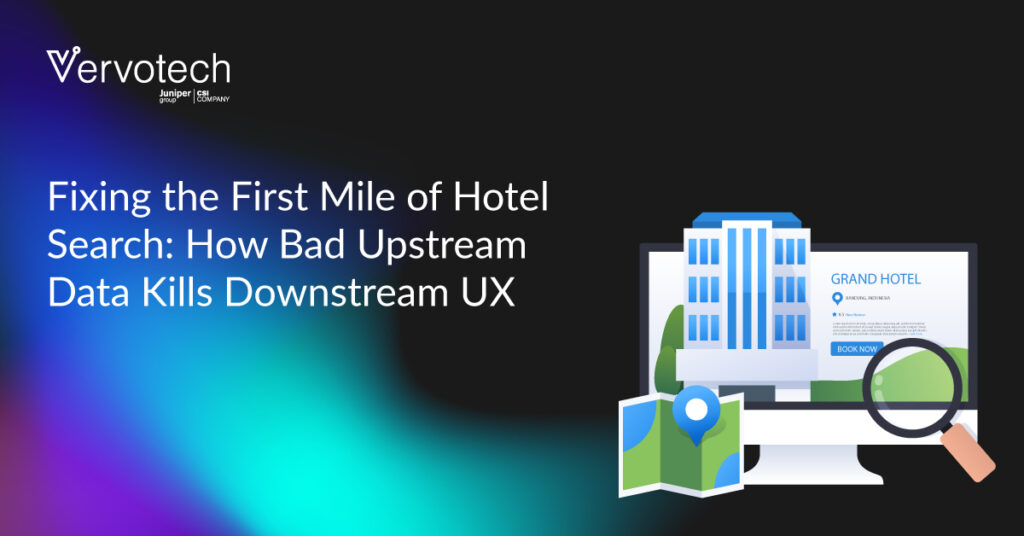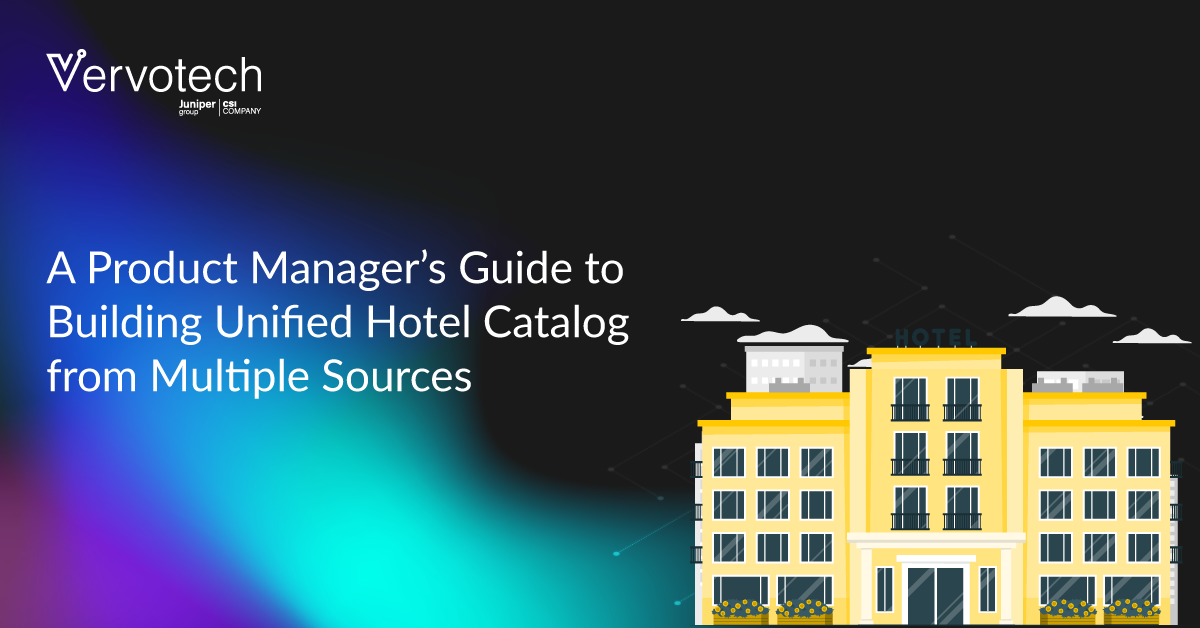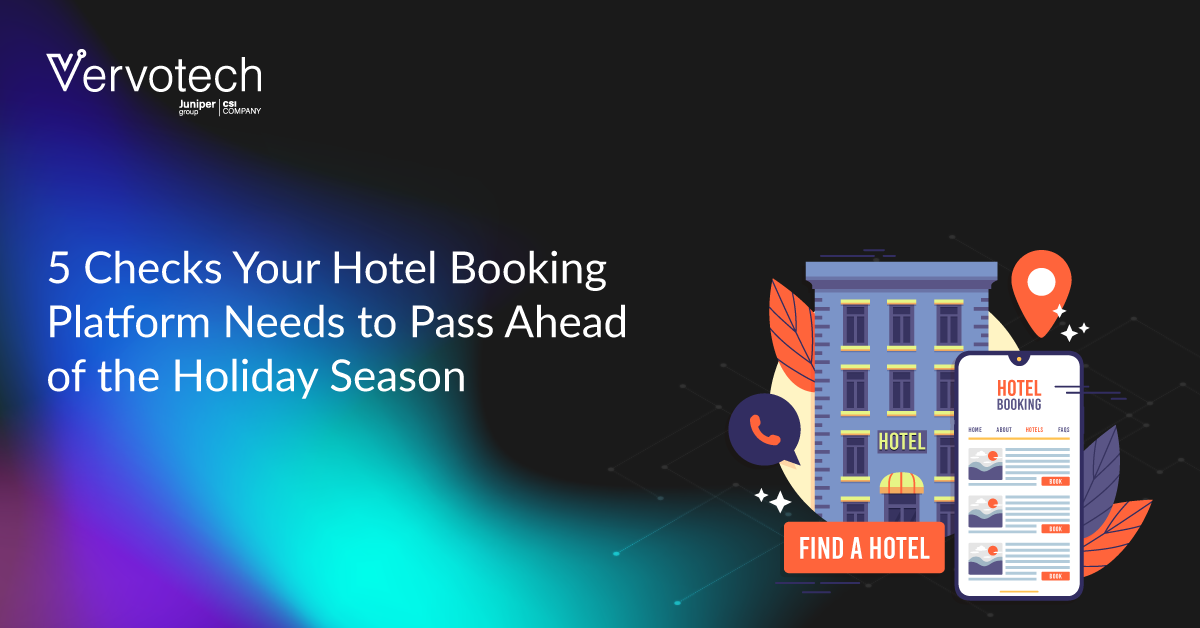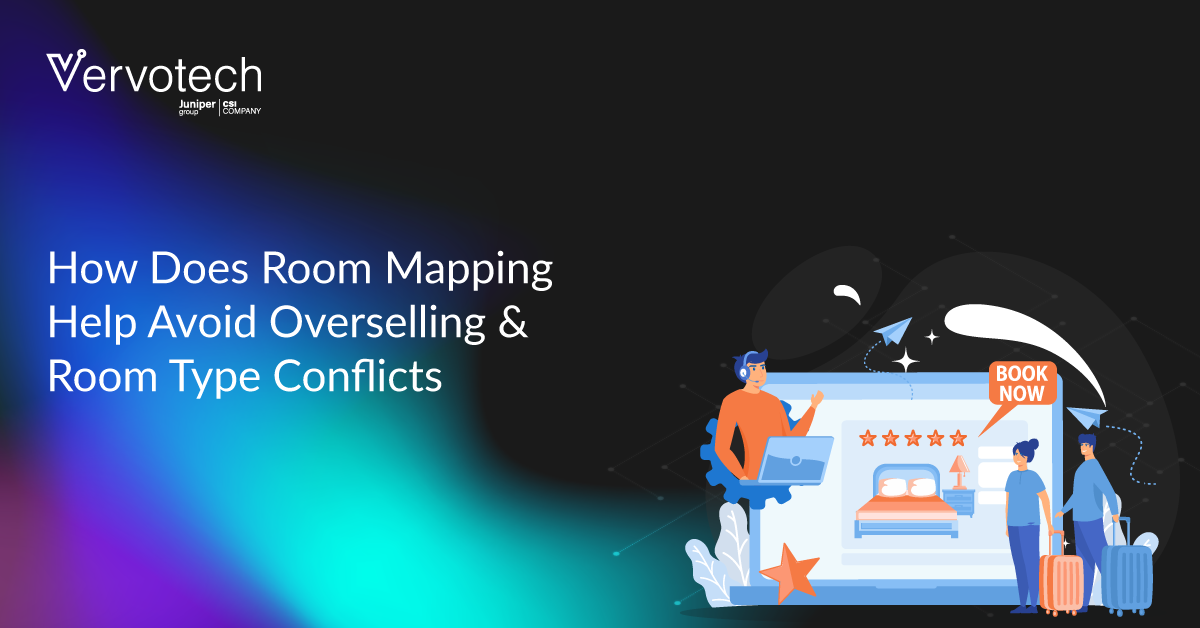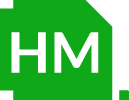The first interaction travelers have with your travel platform is when they search for a hotel- typing a location, filtering preferences, comparing search results, and so on. It’s the first touchpoint in a traveler’s journey with your platform- the first mile where their experience begins, where your brand either wins or loses trust.
But here’s the catch: No matter how beautiful your front end is, if the data flowing into your search engine is broken, the experience is doomed.
This blog explores how cleaning the first mile of hotel data paves the way for smoother user journeys and better conversion.
TL; DR
- Upstream hotel data is the raw information sourced from GDSs, wholesalers, and direct suppliers before it reaches your search and booking systems.
- Downstream UX is what travelers see: hotel listings, search filters, room descriptions, booking flows, all built on upstream data.
- When upstream data is messy, with duplicate listings, inconsistent naming, and vague room types, it quietly breaks the user experience.
- Most hotel platforms suffer from overlapping hotel entries, outdated content, and inaccurate location data due to multiple supplier feeds.
- Bad upstream data leads to user confusion, booking friction, broken filters, and ultimately, lost revenue.
- Travelers don’t blame your suppliers; they blame your brand when listings are unclear or inconsistent.
- A clean first mile means: one listing per hotel, standardized room data, verified amenities, and accurate mapping, before it hits the front end.
- Fixing the front end isn’t enough; you need to clean the source data to ensure smooth UX downstream.
- Vervotech’s hotel and room mapping solutions help travel brands clean, unify, and standardize upstream data from all suppliers.
- Clean upstream data translates into better filters, clearer listings, higher conversion rates, and happier travelers.
What Does Upstream Hotel Data Look Like
Let’s understand these terms with a simple analogy.
Picture this: You run a café.
To run the cafe, you source the ingredients (milk, bread, vegetables, meat, etc.) for the food you make from a vendor or a supplier. You use these ingredients to cook your dishes, which may or may not turn out well depending on the quality of the ingredients you source.
Now think about it in the context of running a hotel booking platform:
- The food you source means the hotel data (hotel names, geo-locations, amenities, policies, etc.) you source from Global Distribution Systems (GDSs), bedbanks, hotel wholesalers, etc. This is your ‘upstream data’.
- The food you prepare using the ingredients, in the context of a hotel booking platform, is the data you show on your hotel booking platform after filtering & reviewing it. This is your ‘downstream data’.
Now that we’ve seen what upstream hotel data typically looks like, let’s take a closer look at why it’s so messy in the first place and how that mess quietly breaks the user experience.
The Invisible Root of Broken Travel UX– Why is Upstream Hotel Data Messy?
Let’s go back to the scenario we discussed in the previous section.
Even though you have the most versatile menu, the best servers, and a smooth reservation system, if your ingredients aren’t fresh, the food won’t turn out nicely, and it will end up ruining your guests’ experience.
One bad experience alone is enough for them to never want to return to your cafe and leave a bad review on the reservation platform. That’s how customer experience works for travel booking platforms, too.
Travel platforms invest heavily in front-end UX, but the root cause of poor experience often lies upstream, meaning the unstructured, inconsistent, and duplicate hotel data received from suppliers creates friction long before the user sees the interface.
And how this data flows into the hotel booking systems, powering your platform’s hotel search results, filters, maps, is what is called ‘downstream data’.
So why does it matter? It matters because if the upstream data is messy, meaning that the hotel listings are inaccurate,
Because if the upstream data is messy- duplicate hotels, incorrect geolocations, vague room types, your users feel the impact. It clutters their search results, makes booking confusing, and chips away at their trust in your platform. And fixing it means starting at the very top, the first mile of your data journey.
These upstream issues may seem technical or behind-the-scenes, but they have a direct and visible impact on what travelers’ experience on your platform. Let’s explore how these hidden data problems affect downstream UX.
How Bad Upstream Data Impacts Downstream UX
In travel businesses, when travelers have an unpleasant experience, they don’t blame the data; they blame the brand.
- They’ll blame your platform when they see five listings for the same hotel.
- They’ll blame your brand when a hotel with a “free breakfast” doesn’t deliver.
- And they’ll abandon their booking if a room called “DLX Double NW” makes no sense to them.
This is the ripple effect of bad upstream data; it quietly, but powerfully, derails the customer’s experience.
Here’s how that plays out:
Duplicate Listings = Confusion
When one hotel shows up multiple times in search results with different prices and images, users lose confidence. They don’t know which one is real, and many drop off instead of risking a booking mistake.
Poor Room Descriptions = Booking Drop-offs
If a user can’t tell the difference between room options or doesn’t know what amenities are included, they’re unlikely to proceed. Incomplete or gibberish room names break the booking flow right at the decision point.
Inaccurate Location Data = Broken Trust
When a hotel is labeled as “central”, but the map says otherwise, travelers feel misled. That one mistake is enough to make them never return.
Broken Filters = Frustrated Searches
Filters only work when the underlying data is structured. If your “free Wi-Fi” or “with breakfast” filter pulls the wrong results, users lose patience and leave.
Support Overload = Higher Costs
When bookings are made based on incorrect or outdated data, your support team spends more time fixing errors, managing complaints, and issuing refunds.
The result? Higher bounce rates, lower conversions, and a growing trust deficit.
Clearly, messy upstream data does more damage than most people realize. But what does good look like? Let’s find out.
What a Clean First Mile Should Look Like
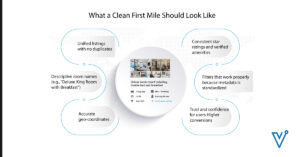
A smooth user experience doesn’t start on the front end; it starts in your data pipeline.
Imagine this instead:
- A single, unified listing for each hotel, no duplicates.
- Room types that are clearly labeled and easy to compare.
- Accurate locations, verified amenities, and up-to-date cancellation policies.
- Filters that just work because the metadata underneath them is clean and consistent.
That’s what a clean first mile looks like: data that’s clear, structured, and dependable before it ever touches your UI.
And when your first mile is clean, everything downstream, like search, filter, maps, booking, and post-booking, feels frictionless. Of course, getting to that clean first mile doesn’t happen automatically. It takes the right tools and systems to standardize and simplify your data pipeline. This is where Vervotech can help.
How to Achieve a Clean First Mile
Fixing hotel search doesn’t start with better UX; it starts with better data.
At Vervotech, we help travel brands clean and standardize their hotel and room data at the source, so the entire booking journey is built on solid ground.
Here’s how we do it:
Hotel Mapping
We identify and merge duplicate hotel entries from multiple suppliers, creating a single, unified record per property- complete with standardized names, addresses, star ratings, and geolocation.
Room Mapping
We clean up vague or inconsistent room types (like “Room1” or “STD DBL No Window”) and group them into clear, traveler-friendly categories with all key inclusions and policies intact.
Content Normalization
We validate and enrich hotel content across feeds, so your listings are complete, current, and consistent, whether the data comes from a GDS, wholesaler, or direct connect.
Plug-and-Play APIs
No heavy lifting. Our structured, API-ready data can be integrated into your systems effortlessly, giving you clean inventory without complexity.
Real Impact, Real Results:
- Reduced mapping time by 40%- Within Earth Holidays
- Increased conversion rate by 30%- Tripjack
- Reduced mapping costs by 40%- Akbar Travels
The moment a traveler types in a destination and hits search, your brand gets evaluated on speed, accuracy, and clarity. But if your upstream data is messy, your downstream experience will always fall short, no matter how much you invest in design or development.
Fixing it isn’t just a technical cleanup; it’s a business advantage. It’s how you reduce booking errors, improve conversions, and build traveler trust. At Vervotech, we help travel businesses lay a clean, structured data foundation, so everything downstream just works.
Ready to clean up your first mile?
Let Vervotech help you deliver a seamless hotel booking experience that travelers trust.
Book a demo and see the difference clean data can make.
Frequently Asked Questions (FAQs)
What’s the difference between hotel mapping and room mapping?
Hotel mapping involves unifying and deduplicating hotel listings from multiple suppliers into a single, accurate property record. Room mapping, on the other hand, standardizes room types, names, and inclusions so that travelers see clear, consistent options across sources.
How often should hotel content be updated to stay accurate?
Ideally, hotel content should be updated in near real-time or at least daily, especially for dynamic attributes like availability, pricing, policies, and promotions. Delayed updates can lead to booking errors or customer complaints.
Can upstream data issues affect API performance or speed?
Yes. Messy or bloated upstream data can slow down API response times, especially if your platform needs to process duplicate records or filter inconsistent fields on the fly. Clean data improves both speed and efficiency.
How does inaccurate hotel content impact SEO for OTAs and travel platforms?
Duplicate listings and inconsistent metadata can lead to poor indexing, diluted authority, and reduced visibility in search engines. Clean, structured content boosts search relevance and helps with better SEO rankings.
Is upstream data quality equally important for B2B travel platforms?
Absolutely. Even B2B platforms that serve TMCs, resellers, or corporate travel managers rely on clean hotel content to ensure consistency, reduce support costs, and maintain trust in their systems.
What types of travel businesses benefit the most from data normalization?
Online travel agencies (OTAs), travel management companies (TMCs), bedbanks, wholesalers, and even hotel chains with third-party integrations benefit from mapping and normalization, especially those sourcing from multiple suppliers.

